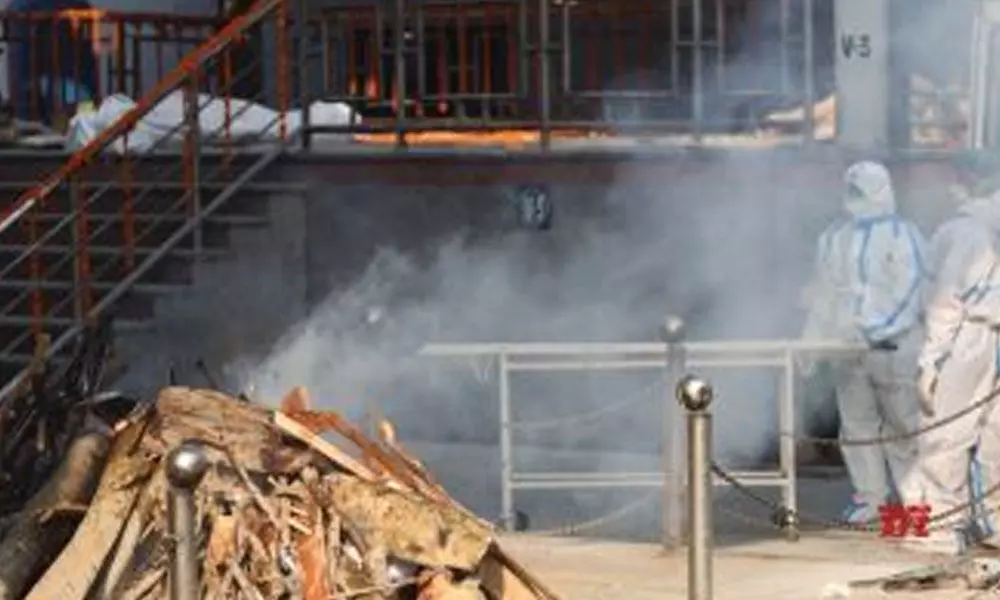Live
- India Faces Blow as Pacer Mohammed Shami Ruled Out for Remainder of Australia Series
- Biden Pardon: Joe Biden Commutes Death Sentences of 37 Inmates, Including Child Killers and Mass Murderers
- South Korea: Yoon believes impeachment trial takes priority over martial law probe
- Strict Action for Non-Adherence to Time Management - DMHO Dr. Swarajya Lakshmi
- Over 13.29 lakh houses approved for rural poor in Maharashtra: Shivraj Chouhan
- District Collector Urges Timely Completion of Indiramma Housing Scheme Survey
- Digital Arrest Scam: Hyderabad Man Duped of ₹7 Lakhs by Fake Crime Branch Police Callers
- Sukhbir Badal seeks President's Police medal for officer who saved his life
- US Firm Accordion Acquires Merilytics, Launches 1,500-Seater Office in Hyderabad
- Free Medical Camp Organized by Alampur Advocate Bar Association
Just In
Cremation workers in Bengaluru living life of abject misery: Report


Cremation workers in Bengaluru living life of abject misery: Report
'Dignity Disposed', a report prepared by the All India Central Council of Trade Unions (AICCTU), highlights the plight of Bengaluru's cremation and burial ground workers, who are forced to work for as long as 14 hours a day due to the surge in Covid related fatalities
Bengaluru: 'Dignity Disposed', a report prepared by the All India Central Council of Trade Unions (AICCTU), highlights the plight of Bengaluru's cremation and burial ground workers, who are forced to work for as long as 14 hours a day due to the surge in Covid related fatalities.
The authors of this report are Swathi Seshadri, Lekha Adavi and Kripa Krishnan (a volunteer), who visited 26 crematoriums and burial grounds between May 4 and 8 to capture the plight of the workers there.
According to them prior to the pandemic, there were around five bodies to be buried or burnt in a day.
"But post April 2021 (second Covid wave), each electric cremation site was receiving 30 to 35 bodies a day while burial grounds belonging to Muslims and Christians were flooded with anywhere between 15 to 25 bodies a day, whereas temporary open cremation sites at Tavarekere and Giddenahalli centres were receiving 75 and 50 bodies respectively a day," the report claimed.
These authors noted that the workers are paid arbitrarily - in some cases once in three or six months or even once in a year.
"They are paid wages ranging from Rs 1,000 a month to Rs 10,500 a month. The minimum wage of Rs 13,132.60 is not paid to the workers, and the Minimum Wages Act is blatantly voilated. These workers are mostly dependent on the largesse of the families who perform the last rites of their loved ones," the report stated.
The 'Dignity Disposed' report also highlighted that whether it is the Bengaluru civic body managed facilities or those run by religious institutions, 'criminal neglect of workers' is rampant and they are compelled to work in 'slave-like conditions'.
"Due to Covid this neglected section is forced to work as long as 14 hours in a day and they do not even get the minimum wages fixed by the government, ESI, Leave, Insurance, decent accommodation and a choice of livelihood - all seem to be a mirage to these workers," the report said and added that despite being an injury-prone job, they are not provided with safety gear or health care benefits.
"Most of these workers stay over in crematoriums for days on end and sleep on gunny bags while literally breaking their backs to deal with the surge in deaths. These workers do not have decent living conditions and lack basic sanitation facilities," the report added.
The authors of the report found that though the workers suffer from slip disc, burnt hands, crushed fingers among other occupational hazards, they are not provided any private or government health insurance cover. No medical facilities are provided to them either.
The report noted that none of the workers was vaccinated against Covid-19 even though they are in the frontline of the pandemic. "These workers have not been vaccinated. All crematorium workers do not even get the required PPEs from BBMP. None of the grave-diggers wore PPEs while digging or closing a grave. None of the workers was provided with sanitizer or soap solutions to maintain hygiene levels after handling dead bodies. Even testing is not made available to all workers. The WHO guidelines on precautionary measures, government guidelines, none of these are being followed at any facility," the report noted.
The report also flagged the dire conditions in the cremation ground premises in which many of the workers often stay.
"Workers in some facilities do not even have access to water or toilets and even women are forced to go out in the open to relieve themselves. Those who ensure the dead get a final resting place do not even have proper facilities to sleep, with some workers even using gunny bags to sleep on," the report pointed out.
The workers, mostly Dalits, want their children to get a good education so that they can leave this caste-based occupation, the report noted. The union has demanded that the government take specific measures for their welfare. They have made a 12-point recommendation to alleviate the sufferings of these workers.

© 2024 Hyderabad Media House Limited/The Hans India. All rights reserved. Powered by hocalwire.com






